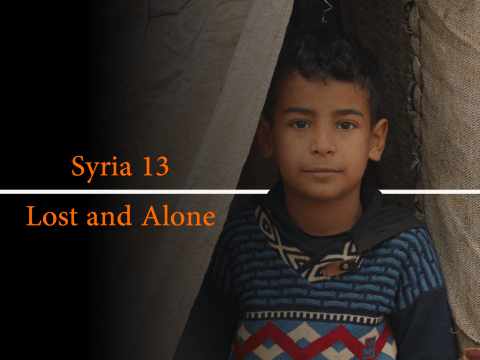World Vision Lambast International Response as Humanitarian Crisis in Syria Continues to Grow 13 Years On

Amman, March 15, 2024 – The international community's response is "inadequate" says World Vision, a leading humanitarian aid organization active in Syria since the early days of the conflict, as the growing humanitarian crisis marks 13 years today. In 2023, the Humanitarian Response Plan for Syria was only a third funded, drastically reducing food assistance and healthcare access for millions.
- Syria ranks among the top ten nations globally for the highest number of people facing hunger, with the World Food Programme (WFP) estimating that over half of the population 12.9 million Syrians, are currently experiencing hunger in 2024, while another 2.6 million are on the brink of food insecurity.
- The need for humanitarian assistance in Syria has reached an all-time high, with 16.7 million people expected to require support in 2024, marking the largest figure since the crisis began in 2011.
- The country continues to endure a protection crisis, with ongoing threats to children, girls, and women. Also, Syria hosts the world's second-largest number of internally displaced persons, totalling 7.2 million, many of whom reside in overcrowded camps, further depleting the already scarce resources.
- Recent earthquake has worsened Syria's dire situation, causing nearly 6,000 deaths and over 12,800 injuries, with many families losing their primary earners. This disaster has pushed millions more into inability to meet their basic needs, highlighting the urgent need for long-term recovery funding and enhanced emergency preparedness.
The protracted conflict, economic downturns, health emergencies like COVID-19 and cholera, coupled with the recent seismic disaster, have pushed Syrian families and children to the brink as they struggle to survive. With 90% of the Syrian population now living below the poverty line, this year, countless Syrians face their 13th winter amid conflict, with many lacking proper shelters, including children who constitute 44% of those in need. Syria hosts the world's second-largest number of internally displaced persons, further straining the very limited resources.
Hunger and malnutrition continue to rise. The World Food Programme's Hunger Map places Syria in the highest category for insufficient food consumption. A staggering 12.9 million people, more than half of Syria's population, are struggling with inadequate food supplies, while acute and chronic malnutrition rates in children soar alarmingly. Nearly 5.9 million people, 64% of whom are children, require immediate nutritional support. The healthcare crisis in Syria has also intensified with limited presence of functioning hospitals, health care centres and staff to address growing needs. With half of the primary healthcare facilities non-operational and a significant drop in healthcare workers, the situation has led to increased child mortality rates.
Families and children are increasingly exposed to protection risks. Essential documentation losses and post-earthquake family separations have escalated child-headed households, child labour, and early marriages. Closures of safe spaces for women and girls due to funding shortages, along with community centres due to security conditions, have heightened risks.Syria's economic downturn has pushed families into dire straits, with children dropping out of school to face labour or early marriages as survival tactics. Particularly in Northwest Syria, limited services and ongoing violence exacerbate vulnerabilities, especially for women and girls at risk of exploitation.
Hosting countries like Jordan and Türkiye, face an unprecedented level of need since the onset of the crisis, dealing with heightened vulnerabilities, rising poverty, and unemployment. Despite grappling with economic hardships and limited resources, host governments provide essential public services such as housing/shelter, healthcare, legal systems, education, waste management, and WASH (Water, Sanitation and Hygiene). They have been under significant strain, bearing the costs of hosting millions of displaced Syrians for years, while also facing the impact of new conflicts and economic challenges in the region.
World Vision's urgent call to action emphasizes not just the need for immediate humanitarian relief but also for a long-term strategy that fosters resilience within the Syrian community. "The compounded effects of prolonged conflict, natural disasters, and funding cuts have left the Syrian population in dire straits," says Emmanuel Isch, World Vision Syria Response's Director. " As we have seen, after 13 years of humanitarian crisis, time is not healing any wounds for Syrians. In fact, as time goes on, the worse those wounds get. The only remedy for Syrians whose lives have been wrecked by the ongoing crisis is action. We must recommit ourselves to finding a solution to the situation in Syria, urging international donors to fully fund the humanitarian needs there, and to ensure unconditional and unrestricted humanitarian access to Northwest Syria."
Last year, World Vision Syria Response reached approximately 2.4 million individuals, including over 1.4 million children, across various sectors such as health and nutrition, protection, mental health and psychosocial support (MHPSS), education, livelihoods, and water, sanitation and hygiene (WASH).
Notes to editor
For more information, please contact: Hamzah Barhameyeh, World Vision Syria Response Communications & Advocacy Manager, Email: hamzah_barhameyeh@wvi.org
World Vision is a global humanitarian organisation dedicated to working with children, families and their communities to reach their full potential by tackling the root causes of poverty and injustice. World Vision serves all people, regardless of religion, race, ethnicity or gender.
For more information, please visit https://www.wvi.org/syria-response or follow us on Twitter @WorldVisionSR.
World Vision Syria Response has been operating inside Syria, Jordan and Türkiye since 2011, where we provide life-saving protection, education, WASH, livelihoods and health services to refugees and local communities